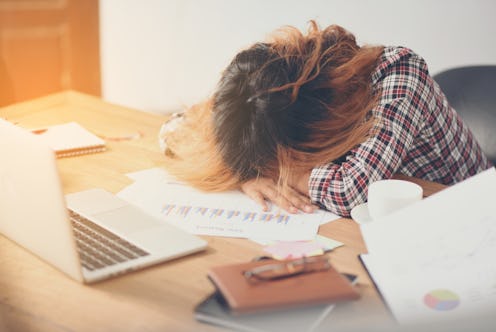
We probably think of business hours as being somewhere in the realm of 9 a.m. to 5 p.m., but are working these hours actually what's best for our bodies? Not according to Oxford University academic Dr. Paul Kelley, who says that the best time to start work in the morning is 10 a.m. — an entire hour later. In fact, he claims that forcing people to work these hours, which inevitably leads to employees being sleep deprived, is comparable to "torture," and is leading to extraordinary levels of stress, illness, and exhaustion. You see, before the age of 55, our bodies' natural circadian rhythm — that internal clock we all have that regulates our behavior patterns of eating, sleeping, and waking — doesn't at all align with the 9-to-5 hours that have become the standard workday. Dr. Kelley therefore thinks it's time for a total societal shift to do right by our biology.
Nor are working adults the only ones who might benefit from a later start to the day. Recently, the National Sleep Foundation began recommending an earlier start time for schools; indeed, a 1998 study showed that adolescents don't go to bed any earlier when they have to start school earlier, resulting in sleep-deprived kids and less-than-ideal circumstances for learning. As Telegraph science editor Sarah Knapton notes, the ideal time to begin school for 16 year olds is 10 a.m., while for university students, it's even later — 11 a.m.
Dr. Kelley also found in his own experience that later start times for students was more ideal for their performance. He used to be a teacher at Monkseaton Middle School, and in this role, changed the start time of the school day from 8:30 a.m. to 10 a.m. He found that by starting school an hour and a half later, the number of students receiving top marks increased by 19 percent. This same principle can be applied to professionals, too, who suffer similar consequences of health and performance by starting the day early.
So what time should we start work? Dr. Kelley believes 10 a.m. is the ideal time. He believes this will help to prevent the sleep deprivation so many of us live with because of when we need to get to work. "This is a huge society issue," Dr Kelley said to the British Science Festival in Bradford, according to the Telegraph. "It is hugely damaging on the body's systems because you are affecting physical, emotional and performance systems in the body." In research, sleep deprivation has been linked to everything from having poorer cognitive performance, to increasing your risk of developing diseases, and to causing poor metabolic functioning. Hugely damaging, indeed.
In order to try to make this better schedule a reality, Oxford is leading an experiment in which students begin the school day at 10 a.m., in tune with their natural circadian rhythm. Over 400 schools in the UK will take part in this experiment over the next four years, with findings expected to be published in 2018.
I hope to see workplaces also take initiative to start the workday later in order to fight against the effects of sleep deprivation. Let's hope that our employers take note and perhaps give us more flexibility to start to the workday later, so we can all get the sleep we need to be at our best.
Images: Fotolia; Giphy (2)